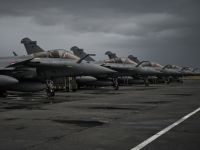Iraq could be back on the missile track, a former chief UN inspector told the Knesset's Foreign Affairs and Defense Committee on Tuesday, according to a Haaretz report Wednesday.
Speaking to the committee, Richard Butler, the former head of the UN Special Commission on arms inspections in Iraq, was quoted by the Israeli daily as saying: "Evidence suggests that Saddam Hussein could be rebuilding his missile project both in the biological and the chemical spheres."
Butler explained that developments in Iraq haven't been monitored since August 1998. He believes that the Iraqis currently possess long-range missiles capable of bearing a number of different warheads.
The ballistic missile test conducted by the Iraqis will propel their weapons program forward, Butler predicted.
Iraq ridiculed on July 4th a US news report that it had restarted its missile program and flight-tested a short-range ballistic missile but did not say whether or not it had the missile mentioned in the report, according to Reuters.
The New York Times had reported on July 1st that Iraq carried out eight tests -- including one last Tuesday -- involving Al-Samoud, a ballistic missile that could carry conventional explosives or chemical and biological weapons, attributing the information to Clinton administration and American military officials.
The range of the tested missile is less than 150 kilometers or 95 miles, which means it does not violate UN restrictions. But the flight tests show that production plants and research labs destroyed in 1998 US and British missile strikes on Iraq have been rebuilt, the New York Times report said.
Butler emphasized that Iraqi weapons capability pertains to all three areas - chemical, biological and nuclear.
Chemical: Butler stated that Iraq is capable of manufacturing significant quantities of VX gas (a nerve gas) and mustard gas.
Biological: Butler recalled that the Iraqis concealed all information about biological weapon capability from the UN inspection team. He estimates, however, that the Iraqis have 16 missile warheads that could be loaded with anthrax.
Nuclear: Iraq has no scientific or technical barriers blocking development of nuclear weapons, Butler declared. Should Iraq acquire the necessary raw materials, Iraq would have nuclear weapons within a year, he suggested – (Several Sources)
© 2000 Al Bawaba (www.albawaba.com)







